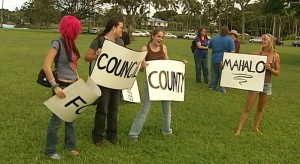 Video by David Corrigan | Voice of Stephanie Salazar
Video by David Corrigan | Voice of Stephanie Salazar
Citizens and students gathered in front of the Kamehameha Statue in Hilo on Tuesday, to wave signs and say “mahalo” to the Hawaii County council for supporting the Big Island’s new Fair Elections law.
The pilot program provides a full public funding option for county council elections. In the 2010 elections, four out of nine councilors won their election campaigns using the pilot program, also known as Act 244.
Dr. Noelie Rodriguez, a sociology professor at Hilo Community College, says this type of option is critically important to our nation’s democracy.
From a media release issued by the organizers:
“I am grateful to the County Council members who pushed for this critically important reform that can restore our democracy. It is the reform that makes all the other reforms possible,” said Dr. Noelie Rodriguez, a sociology professor at Hilo Community College.
Student Jennifer Ruggles agreed. “Getting private interests out of our public policy is the first step and when officials run on only public money they become accountable solely to the public’s needs,” she said.
Money in politics has been a contentious issue lately since the shocking U.S. Supreme Court decision to allow corporations to spend unlimited amounts on independent expenditures, contributions that are not officially associated with a candidate’s political action committee or campaign.
Fair Elections advocates believe a full public funding option for elections is the antidote to the “Citizens United” decision. “Public funding allows candidates to focus on long-term solutions in the public interest instead of short term priorities of special interest campaign donors”, said Keahi Tajon, a student organizer.
The Supreme Court stunned election law experts again when they decided to hear a case challenging one piece of Arizona’s Fair Elections law. The matching funds provision of Arizona’s law provides extra money to qualified publicly funded candidates when they’re outspend by a privately funded competitor.
Since Hawaii’s Big Island pilot program is similar to Arizona’s law, the pending Supreme Court decision is significant. Advocates say they have replacement language to insert into Hawaii’s law if there’s a negative decision by the Supreme Court, however.
“In the event that the Supreme Court rules against the matching funds mechanism, we can replace that one section of the law with new language that is safe from this conservative court”, said Kory Payne, executive director for Voter Owned Hawaii, a non-partisan group that helped push for the Big Island pilot.
“Delegates and voters in the 1978 Constitutional Convention knew that getting private money out of elections was the right thing to do. We owe it to them to update the partial public funding system, and remember how private money in elections can end up costing us all in the end”, added Payne.

by Big Island Video News11:42 am
on at
STORY SUMMARY
Video by David Corrigan | Voice of Stephanie Salazar Citizens and students gathered in front of the Kamehameha Statue in Hilo on Tuesday, to wave signs and say “mahalo” to the Hawaii County council for supporting the Big Island’s new Fair Elections law. The pilot program provides a full public funding option for county council […]